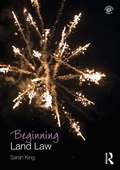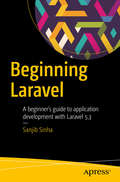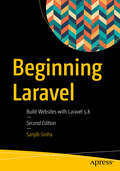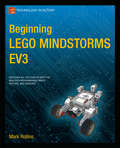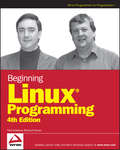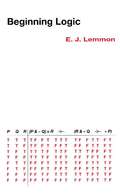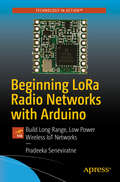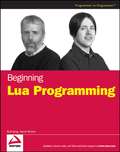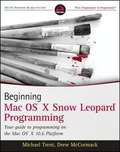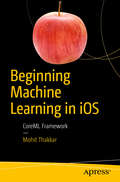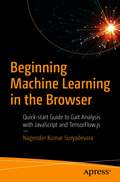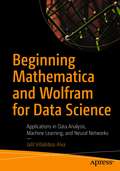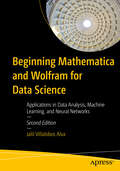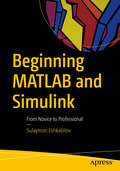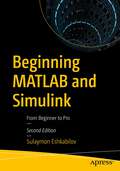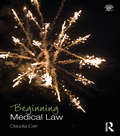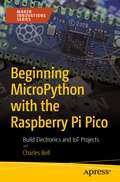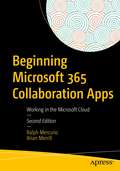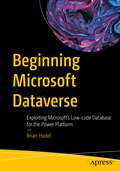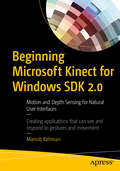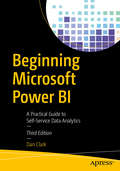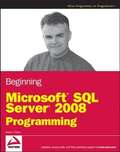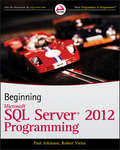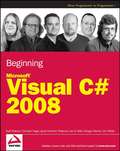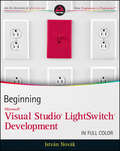- Table View
- List View
Beginning Land Law (Beginning the Law)
by Sarah KingWhether you’re new to higher education, coming to legal study for the first time or just wondering what Land Law is all about, Beginning Land Law is the ideal introduction to help you hit the ground running. Starting with the basics and an overview of each topic, it will help you come to terms with the structure, themes and issues of the subject so that you can begin your Land Law module with confidence. Adopting a clear and simple approach with legal vocabulary explained in a detailed glossary, Sarah King breaks the subject of Land Law down using practical everyday examples to make it understandable for anyone, whatever their background. Diagrams and flowcharts simplify complex issues, important cases are identified and explained and on-the- spot questions help you recognise potential issues or debates within the law so that you can contribute in classes with confidence. Beginning Land Law is an ideal first introduction to the subject for LLB, GDL or ILEX and especially international students, those enrolled on distance learning courses or on other degree programmes.
Beginning Laravel: A beginner's guide to application development with Laravel 5.3
by Sanjib SinhaLearn about dependency injection, interfaces, service providers, SOLID design, and more with practical and real-world code examples. This book covers everything you need to get started in application development with Laravel 5. 3. Beginning Laravel covers features such as method injection, contracts, and authentication. After reading this book, you can develop any application using Laravel 5. It details all you need to know, including the model-view-controller pattern, SQLite databases, routing, authorization, and building CRUD applications. What You Will Learn Work with the new Laravel framework and its new features Develop web applications with Laravel Absorb the concepts of authentication and database migration Manage databases with Eloquent ORM Use middleware, contracts, and facades Who This Book Is For Readers who are new to Laravel development.
Beginning Laravel: Build Websites with Laravel 5.8
by Sanjib SinhaDevelop cutting-edge websites and applications using the new features of Laravel 5.8. This book starts with an introduction to Laravel and takes a glance at its newly introduced features. Moving on to setting up your development environment, you will learn how the composer works. In addition to this, you will be introduced to Valet, Homestead, Virtual Box, Vagrant, and Forge in Laravel. With this foundation, you will be ready to get started writing your first Laravel apps.To do so, you will learn to manage routes and controllers and how the Blade template works. Moving on to models, you will work with route model binding and get to know the relationship between models, databases, and Eloquent. Along the way you will define methods on your Eloquent model classes using different types of relationships. Shifting focus to handling user data, you will see how redirect methods work. You will also get to know the inner workings of requests and responses. Continuing the data theme, Beginning Laravel covers basic and grouped artisan commands and how to handle databases with Tinker. By being able to handle data effectively, your applications will come alive for your users, giving them the functionality they need.The last section of the book handles core concepts such as sending emails, alerting users via notifications, and implementing SOLID design principles. You will see how to decouple your application classes by using events and listeners. What You Will LearnProtect your app with authentication and authorization Build a complex relationship between entities using Eloquent modelsTake advantage of containers and facadesUse the mail template Create and configure events Work with Laravel PassportDeploy API authentication Discover new Laravel 5.8 features such as dump server and email verificationWho This Book Is ForThose new to Laravel and PHP web development or those who have some background in PHP/Laravel who are new to Laravel's newest release.
Beginning LEGO MINDSTORMS EV3
by Mark RollinsBeginning LEGO MINDSTORMS EV3 shows you how to create new fun and fantastic creations with the new EV3 programmable brick along with other new EV3 pieces and features. You'll learn the language of the EV3 brick, and then go on to create a variety of programmable vehicles using MINDSTORMS and Technic parts. You'll then move into creating robot parts, including robotic arms. You'll even learn how to make different types of MINDSTORMS walkers. Finally, you'll learn how to incorporate light and sound into your amazing EV3 creations. Whether you're a MINDSTORMS enthusiast wanting to know more about EV3, a robotics competitor, or just a LEGO fan who wants to learn all about what EV3 can do, Beginning LEGO MINDSTORMS EV3 will give you the knowledge you need. Note: the printed book is in black and white. The Kindle and ebook versions are in color (black and white on black and white Kindles). What you'll learn How to program the new EV3 brick The different components new to the EV3 system How to program the EV3 with LabView How to build fantastic robotic creations How to incorporate Technic creations into MINDSTORMS Who this book is for MINDSTORMS and robotics enthusiasts who want to learn about EV3, and people who are completely new to MINDSTORMS and want a thorough and fun introduction. Table of Contents 1. Introduction to MINDSTORMS EV3 2. How to Program the EV3 Brick 3. Taking Control of a Vehicle with LEGO MINDSTORMS 4. Sound and Light 5. Data Logging and Advanced Programming 6. Special Construction Projects 7. The Robotic Arm 8. Creator and the Walking Robot
Beginning Linux Programming
by Neil Matthew Richard StonesBeginning Linux Programming, Fourth Edition continues its unique approach to teaching UNIX programming in a simple and structured way on the Linux platform. Through the use of detailed and realistic examples, students learn by doing, and are able to move from being a Linux beginner to creating custom applications in Linux. The book introduces fundamental concepts beginning with the basics of writing Unix programs in C, and including material on basic system calls, file I/O, interprocess communication (for getting programs to work together), and shell programming. Parallel to this, the book introduces the toolkits and libraries for working with user interfaces, from simpler terminal mode applications to X and GTK+ for graphical user interfaces. Advanced topics are covered in detail such as processes, pipes, semaphores, socket programming, using MySQL, writing applications for the GNOME or the KDE desktop, writing device drivers, POSIX Threads, and kernel programming for the latest Linux Kernel.
Beginning Logic
by E. J. Lemmon..."The aim of the book is to provide the student with a good working knowledge of the prepositional and predicate calculi--the foundations upon which modern symbolic logic is built. Accordingly, emphasis is placed on the actual technique of proof-discovery."
Beginning LoRa Radio Networks with Arduino: Build Long Range, Low Power Wireless IoT Networks
by Pradeeka SeneviratneCreate your own LoRa wireless projects for non-industrial use and gain a strong basic understanding of the LoRa technology, LoRa WAN, and LPWAN. You'll start by building your first LoRa wireless channel and then move on to various interesting projects such as setting up networks with a LoRa gateway, communicating with IoT servers using RESTful API and MQTT protocol, and real-time GPS tracking. With LoRa wireless and LoRaWAN, you can build a wide array of applications in the area of smart agriculture, smart cities, smart environment, smart healthcare, smart homes and buildings, smart industrial control, smart metering, smart supply chain and logistics. Beginning LoRa Radio Networks with Arduino provides a practical introduction and uses affordable and easy to obtain hardware to build projects with the Arduino development environment.What You’ll LearnUnderstand the hardware need to build LoRaWANUse the Arduino development environment to write codeConnect to Arduino hardware and upload programs and communicate with themSetup networks with LoRa gatewayShow real time track with tail, and path historyWho This Book Is ForInventors, hackers, crafters, students, hobbyists, and scientists
Beginning Lua Programming
by Kurt Jung Aaron BrownThis book is for students and professionals who are intrigued by the prospect of learning and using a powerful language that provides a rich infrastructure for creating programs. No programming knowledge is necessary to benefit from this book except for the section on Lua bindings, which requires some familiarity with the C programming language. A certain comfort level with command-line operations, text editing, and directory structures is assumed. You need surprisingly little in the way of computer resources to learn and use Lua. This book focuses on Windows and Unix-like (including Linux) systems, but any operating system that supports a command shell should be suitable. You'll need a text editor to prepare and save Lua scripts. If you choose to extend Lua with libraries written in a programming language like C, you'll need a suitable software development kit. Many of these kits are freely available on the Internet but, unlike Lua, they can consume prodigious amounts of disk space and memory.
Beginning Mac OS X Snow Leopard Programming
by Michael Trent Drew MccormackA solid introduction to programming on the Mac OS X Snow Leopard platformThe Mac OS X Snow Leopard system comes with everything you need in its complete set of development tools and resources. However, finding where to begin can be challenging. This book serves as an ideal starting point for programming on the Mac OS X Snow Leopard platform. Step-by-step instructions walk you through the details of each featured example so that you can type them out, run them, and even figure out how to debug them when they don't work right. Taking into account that there is usually more than one way to do something when programming, the authors encourage you to experiment with a variety of solutions. This approach enables you to efficiently start writing programs in Mac OS X Snow Leopard using myriad languages and put those languages together in order to create seamless applications.Coverage Includes:The Mac OS X EnvironmentDeveloper ToolsXcodeInterface BuilderThe C LanguageThe Objective-C LanguageAn Introduction to CocoaDocument-Based Cocoa ApplicationsCore Data-Based Cocoa ApplicationsAn Overview of Scripting LanguagesThe Bash ShellAppleScript and AppleScriptObjCJavascript, Dashboard, and DashcodeNote: CD-ROM/DVD and other supplementary materials are not included as part of eBook file.
Beginning Machine Learning in iOS: CoreML Framework
by Mohit ThakkarImplement machine learning models in your iOS applications. This short work begins by reviewing the primary principals of machine learning and then moves on to discussing more advanced topics, such as CoreML, the framework used to enable machine learning tasks in Apple products. Many applications on iPhone use machine learning: Siri to serve voice-based requests, the Photos app for facial recognition, and Facebook to suggest which people that might be in a photo. You'll review how these types of machine learning tasks are implemented and performed so that you can use them in your own apps. Beginning Machine Learning in iOS is your guide to putting machine learning to work in your iOS applications.What You'll LearnUnderstand the CoreML componentsTrain custom modelsImplement GPU processing for better computation efficiencyEnable machine learning in your application Who This Book Is ForNovice developers and programmers who wish to implement machine learning in their iOS applications and those who want to learn the fundamentals about machine learning.
Beginning Machine Learning in the Browser: Quick-start Guide to Gait Analysis with JavaScript and TensorFlow.js
by Nagender Kumar SuryadevaraApply Artificial Intelligence techniques in the browser or on resource constrained computing devices. Machine learning (ML) can be an intimidating subject until you know the essentials and for what applications it works. This book takes advantage of the intricacies of the ML processes by using a simple, flexible and portable programming language such as JavaScript to work with more approachable, fundamental coding ideas. Using JavaScript programming features along with standard libraries, you'll first learn to design and develop interactive graphics applications. Then move further into neural systems and human pose estimation strategies. For training and deploying your ML models in the browser, TensorFlow.js libraries will be emphasized. After conquering the fundamentals, you'll dig into the wilderness of ML. Employ the ML and Processing (P5) libraries for Human Gait analysis. Building up Gait recognition with themes, you'll come to understand a variety of ML implementation issues. For example, you’ll learn about the classification of normal and abnormal Gait patterns. With Beginning Machine Learning in the Browser, you’ll be on your way to becoming an experienced Machine Learning developer. What You’ll LearnWork with ML models, calculations, and information gatheringImplement TensorFlow.js libraries for ML modelsPerform Human Gait Analysis using ML techniques in the browser Who This Book Is For Computer science students and research scholars, and novice programmers/web developers in the domain of Internet Technologies
Beginning Mathematica and Wolfram for Data Science: Applications in Data Analysis, Machine Learning, and Neural Networks
by Jalil Villalobos AlvaEnhance your data science programming and analysis with the Wolfram programming language and Mathematica, an applied mathematical tools suite. The book will introduce you to the Wolfram programming language and its syntax, as well as the structure of Mathematica and its advantages and disadvantages.You’ll see how to use the Wolfram language for data science from a theoretical and practical perspective. Learning this language makes your data science code better because it is very intuitive and comes with pre-existing functions that can provide a welcoming experience for those who use other programming languages. You’ll cover how to use Mathematica where data management and mathematical computations are needed. Along the way you’ll appreciate how Mathematica provides a complete integrated platform: it has a mixed syntax as a result of its symbolic and numerical calculations allowing it to carry out various processes without superfluous lines of code. You’ll learn to use its notebooks as a standard format, which also serves to create detailed reports of the processes carried out. What You Will Learn Use Mathematica to explore data and describe the concepts using Wolfram language commands Create datasets, work with data frames, and create tables Import, export, analyze, and visualize data Work with the Wolfram data repository Build reports on the analysis Use Mathematica for machine learning, with different algorithms, including linear, multiple, and logistic regression; decision trees; and data clustering Who This Book Is For Data scientists new to using Wolfram and Mathematica as a language/tool to program in. Programmers should have some prior programming experience, but can be new to the Wolfram language.
Beginning Mathematica and Wolfram for Data Science: Applications in Data Analysis, Machine Learning, and Neural Networks
by Jalil Villalobos AlvaEnhance your data science programming and analysis with the Wolfram programming language and Mathematica, an applied mathematical tools suite. This second edition introduces the latest LLM Wolfram capabilities, delves into the exploration of data types in Mathematica, covers key programming concepts, and includes code performance and debugging techniques for code optimization. You’ll gain a deeper understanding of data science from a theoretical and practical perspective using Mathematica and the Wolfram Language. Learning this language makes your data science code better because it is very intuitive and comes with pre-existing functions that can provide a welcoming experience for those who use other programming languages. Existing topics have been reorganized for better context and to accommodate the introduction of Notebook styles. The book also incorporates new functionalities in code versions 13 and 14 for imported and exported data. You’ll see how to use Mathematica, where data management and mathematical computations are needed. Along the way, you’ll appreciate how Mathematica provides an entirely integrated platform: its symbolic and numerical calculation result in a mized syntax, allowing it to carry out various processes without superfluous lines of code. You’ll learn to use its notebooks as a standard format, which also serves to create detailed reports of the processes carried out. What You Will Learn Create datasets, work with data frames, and create tables Import, export, analyze, and visualize data Work with the Wolfram data repository Build reports on the analysis Use Mathematica for machine learning, with different algorithms, including linear, multiple, and logistic regression; decision trees; and data clustering Who This Book Is For Data scientists who are new to using Wolfram and Mathematica as a programming language or tool. Programmers should have some prior programming experience, but can be new to the Wolfram language.
Beginning MATLAB and Simulink: From Novice to Professional
by Sulaymon EshkabilovEmploy essential and hands-on tools and functions of the MATLAB and Simulink packages, which are explained and demonstrated via interactive examples and case studies. This book contains dozens of simulation models and solved problems via m-files/scripts and Simulink models which help you to learn programming and modeling essentials. You’ll become efficient with many of the built-in tools and functions of MATLAB/Simulink while solving engineering and scientific computing problems. Beginning MATLAB and Simulink explains various practical issues of programming and modelling in parallel by comparing MATLAB and Simulink. After reading and using this book, you'll be proficient at using MATLAB and applying the source code from the book's examples as templates for your own projects in data science or engineering. What You Will LearnGet started using MATLAB and SimulinkCarry out data visualization with MATLABGain the programming and modeling essentials of MATLABBuild a GUI with MATLABWork with integration and numerical root finding methodsApply MATLAB to differential equations-based models and simulationsUse MATLAB for data science projectsWho This Book Is ForEngineers, programmers, data scientists, and students majoring in engineering and scientific computing.
Beginning MATLAB and Simulink: From Beginner to Pro
by Sulaymon EshkabilovEmploy essential tools and functions of the MATLAB and Simulink packages, which are explained and demonstrated via interactive examples and case studies. This revised edition covers features from the latest MATLAB 2022b release, as well as other features that have been released since the first edition published. This book contains dozens of simulation models and solved problems via m-files/scripts and Simulink models which will help you to learn programming and modelling essentials. You’ll become efficient with many of the built-in tools and functions of MATLAB/Simulink while solving engineering and scientific computing problems. Beginning MATLAB and Simulink, Second Edition explains various practical issues of programming and modelling in parallel by comparing MATLAB and Simulink. After studying and using this book, you'll be proficient at using MATLAB and Simulink and applying the source code and models from the book's examples as templates for your own projects in data science or engineering. What You Will LearnMaster the programming and modelling essentials of MATLAB and SimulinkCarry out data visualization with MATLABBuild a GUI and develop App with MATLABWork with integration and numerical root finding methodsApply MATLAB to differential equations-based models and simulationsUse MATLAB and Simulink for data science projects Who This Book Is ForEngineers, programmers, data scientists, and students majoring in engineering and scientific computing who are new to MATLAB and Simulink.
Beginning Medical Law (Beginning the Law)
by Claudia CarrWhether you’re new to higher education, coming to legal study for the first time or just wondering what Medical Law is all about, Beginning Medical Law is the ideal introduction to help you hit the ground running. Starting with the basics and an overview of each topic, it will help you come to terms with the structure, themes and issues of the subject so that you can begin your Medical Law module with confidence. Adopting a clear and simple approach with legal vocabulary carefully clarified, Claudia Carr breaks the subject of Medical Law down using practical everyday examples to make it understandable for anyone, whatever their background. Diagrams and flowcharts simplify complex issues, important cases are identified and explained and on-the- spot questions help you recognise potential issues or debates within the law so that you can contribute in classes with confidence. Beginning Medical Law is an ideal first introduction to the subject for LLB, GDL or ILEX and especially international students, those enrolled on distance learning courses or on other degree programmes.
Beginning MicroPython with the Raspberry Pi Pico: Build Electronics and IoT Projects
by Charles BellProgram the Raspberry Pi Pico, the latest microcontroller board from raspberrypi.org, with MicroPython. This book will take you on a tour of the Raspberry Pi Pico, including how to get started using the microcontroller, seeing which alternative microcontrollers are available, and how to connect and run simple code examples. You’ll program example projects in MicroPython using Python on your PC as a learning platform. Then build your hardware skillset working with electronics and breadboard circuits. You'll implement example projects with all steps explained, including hardware connections and executing the project. Then apply them to real-world, approachable projects using the accessible Raspberry Pi Pico! The book shows how the cloud is used for IoT data and find out what popular cloud systems currently exist for IoT. Finally, you'll use ThingSpeak for hosting IoT data including connecting your Pico to the Internet. Beginning MicroPython with the Raspberry Pi Pico allows you to build up your skills to more advanced IoT projects and Cloud systems! What You Will LearnBuild valuable programming skills with MicroPython Explore the Raspberry Pi Pico and similar boardsDevelop your own electronics and IOT projectsIncorporate the Grove component system with the Raspberry Pi PicoWho This Book Is ForBeginners interested in learning to work with the Raspberry Pi Pico using MicroPython on microcontrollers with little to no experience in programming, hardware, or electronics. The book should also appeal to those who wanting to gain experience with building electronic solutions with microcontrollers.
Beginning Microsoft 365 Collaboration Apps: Working in the Microsoft Cloud
by Ralph Mercurio Brian MerrillStart making the most of the latest collaboration tools in Microsoft 365—including Teams, SharePoint, Power Apps, Power BI, Power Automate, Microsoft Groups, Office ProPlus, Yammer, Planner, Stream, Forms, and OneDrive. Integrate these collaboration tools into your team’s projects to boost productivity, engagement, innovation, and enjoyment at work. This book walks you through all the latest features, teaching you how to choose the right tools and get the most out of them for your situation.While technologies for collaboration are more advanced than ever before, there also are more of them, making it all the more confusing. Beginning Microsoft 365 Collaboration Apps will help you make sense of what is available and provide prescriptive guidance to you and your team on how to be more productive.This fully updated and expanded new edition contains lots of new content, screenshots and samples, and all new chapters on Power BI and Power Apps.What You Will LearnKnow the collaboration applications and features available across Microsoft 365, and how to choose the ones that are right for you and your colleagues in any given situationUnderstand the software-as-a-service (SaaS) model and how it enables users to be more effective and productive in remote situationsDiscover how multi-device usability and real-time cloud synchronization can help your team collaborate anytime, anywhere, across the appsFind out how Planner can help you manage projects and tasks, even without a project managerExplore Microsoft Power Automate and Power Apps to connect applications and services and create codeless applications and workflowsWho This Book is ForMicrosoft 365 business users with a limited technical background. You should be familiar with the Microsoft Office suite of products such as Word and Outlook, and work in a team environment. An active Microsoft 365 would be useful as well.
Beginning Microsoft Dataverse: Exploiting Microsoft’s Low-code Database for the Power Platform
by Brian HodelUnderstand the role that Dataverse plays in the low-code revolution that helps businesses gain advantage from being more agile with technology. This book shows you how to use Dataverse to solve business problems by describing the layers of a solution in the Power Platform and the options that exist at each layer so you can make informed decisions as you develop your solutions. The book shows how Dataverse is a central piece of the Microsoft Power Platform and helps tech-savvy professionals move nimbly and seize the day when opportunities present themselves. The book starts out by covering the platform in terms of its layers so you can orient yourself with the features that exist at each level and what that means to you as a developer. You will learn how to work inside the data layer to design tables to store data and relationships and manage how it all works together. You will learn how to apply business logic and validation in the business layer to ensure data integrity and enforce process compliance. You will learn how to design interfaces in the presentation layer to allow users to interact with your data and processes in user-friendly applications. And you will learn how to utilize third-party integration tools to create seamless connections between your solution and legacy systems so you can develop enterprise-grade tools in record time. What You Will LearnUnderstand the layers of Dataverse and the features at each layerCreate tables and relationships to store data and manage interactionsBuild applications to allow users to interact with your data using logical interfacesDesign business logic and workflows to ensure data integrity and automationConfigure security to control access to data and prevent unauthorized accessExplore the options for integration with third-party systems Who This Book Is ForMicrosoft Power Platform users who want to learn how to access the power of the Power Platform and leverage Dataverse to build powerful, robust, and resilient tools; power users and citizen developers who are looking for tools to quickly build scalable business solutions that don’t require a strong developer background; pro developers who want to learn how to utilize use the Power Platform to speed up the development cycle and deliver value to customers faster than ever before
Beginning Microsoft Kinect for Windows SDK 2.0: Motion and Depth Sensing for Natural User Interfaces
by Mansib RahmanDevelop applications in Microsoft Kinect 2 using gesture and speech recognition, scanning of objects in 3D, and body tracking. Create motion-sensing applications for entertainment and practical uses, including for commercial products and industrial applications. Beginning Microsoft Kinect for Windows SDK 2. 0 is dense with code and examples to ensure that you understand how to build Kinect applications that can be used in the real world. Techniques and ideas are presented to facilitate incorporation of the Kinect with other technologies. What You Will Learn Set up Kinect 2 and a workspace for Kinect application development Access audio, color, infrared, and skeletal data streams from Kinect Use gesture and speech recognition Perform computer vision manipulations on image data streams Develop Windows Store apps and Unity3D applications with Kinect 2 Take advantage of Kinect Fusion (3D object mapping technology) and Kinect Ripple (Kinect projector infotainment system) Who This Book Is For Developers who want to include the simple but powerful Kinect technology into their projects, including amateurs and hobbyists, and professional developers
Beginning Microsoft Power BI: A Practical Guide to Self-Service Data Analytics
by Dan ClarkAnalyze company data quickly and easily using Microsoft’s powerful data tools. Learn to build scalable and robust data models, clean and combine different data sources effectively, and create compelling and professional visuals. Beginning Power BI is a hands-on, activity-based guide that takes you through the process of analyzing your data using the tools that that encompass the core of Microsoft’s self-service BI offering. Starting with Power Query, you will learn how to get data from a variety of sources, and see just how easy it is to clean and shape the data prior to importing it into a data model. Using Power BI tabular and the Data Analysis Expressions (DAX), you will learn to create robust scalable data models which will serve as the foundation of your data analysis. From there you will enter the world of compelling interactive visualizations to analyze and gain insight into your data. You will wrap up your Power BI journey by learning how to package and share your reports and dashboards with your colleagues. Author Dan Clark takes you through each topic using step-by-step activities and plenty of screen shots to help familiarize you with the tools. This third edition covers the new and evolving features in the Power BI platform and new chapters on data flows and composite models. This book is your hands-on guide to quick, reliable, and valuable data insight. What You Will Learn Simplify data discovery, association, and cleansingBuild solid analytical data models Create robust interactive data presentations Combine analytical and geographic data in map-based visualizations Publish and share dashboards and reports Who This Book Is For Business analysts, database administrators, developers, and other professionals looking to better understand and communicate with data
Beginning Microsoft SQL Server 2008 Programming
by Robert VieiraThis comprehensive introduction to SQL Server begins with an overview of database design basics and the SQL query language along with an in-depth look at SQL Server itselfProgresses on to a clear explanation of how to implement fundamental concepts with the new 2008 version of SQL ServerDiscusses creating and changing tables, managing keys, writing scripts, working with stored procedures, programming with XML, using SQL Server Reporting and Integration Services, and moreFeatures updated and new material, including new examples using Microsoft's AdventureWorks sample database
Beginning Microsoft SQL Server 2012 Programming
by Robert Vieira Paul AtkinsonGet up to speed on the extensive changes to the newest release of Microsoft SQL ServerThe 2012 release of Microsoft SQL Server changes how you develop applications for SQL Server. With this comprehensive resource, SQL Server authority Robert Vieira presents the fundamentals of database design and SQL concepts, and then shows you how to apply these concepts using the updated SQL Server. Publishing time and date with the 2012 release, Beginning Microsoft SQL Server 2012 Programming begins with a quick overview of database design basics and the SQL query language and then quickly proceeds to show you how to implement the fundamental concepts of Microsoft SQL Server 2012.You'll explore the key additions and changes to this newest version, including conditional action constructs, enhanced controls for results paging, application integration with SharePoint and Excel, and development of BI applications.Covers new features such as SQL Azure for cloud computing, client-connectivity enhancements, security and compliance, data replication, and data warehouse performance improvements Addresses essential topics including managing keys, writing scripts, and working with store procedures Shares helpful techniques for creating and changing tables, programming with XML, and using SQL Server Reporting and Integration Services Beginning Microsoft SQL Server 2012 Programming demystifies even the most difficult challenges you may face with the new version of Microsoft SQL Server.
Beginning Microsoft Visual C# 2008
by Jacob Hammer Pedersen Jon D. Reid Christian Nagel Eric White Morgan Skinner Karli WatsonThe book is aimed at novice programmers who wish to learn programming with C# and the .NET framework. The book starts with absolute programming basics. It then moves into Web and Windows programming, data access (databases and XML), and more advanced technologies such as graphics programming with GDI+ and basic networking. The book is divided into sections including:The C# Language: Basic language skills using console application. Content moves from the absolute basics to fairly involved OOP skills.Windows Vista Programming: Using basic Windows applications, reinforcing earlier OOP and debugging skills.Web Programming: Putting together basic Web applications, highlighting differences between Web and Windows programming.Data Access: Accessing all kinds of data sources from Web and Windows applications, including SQL usage, XML, file system data, and Web Services.Additional Techniques: "The fun stuff", including Windows Presentation Foundation, Windows Workflow, Windows Communication Foundation, GDI+, networking, Windows Services, and so on.The book makes complicated subjects seem easy to learn, and it inspires readers to investigate areas further on their own by providing references to additional material, and exercise questions that require significant effort and personal research to complete.
Beginning Microsoft Visual Studio LightSwitch Development
by István NovákLearn how LightSwitch can accelerate and simplify application developmentAs Microsoft's newest offering for simplifying application development, LightSwitch opens the development door to creating applications without writing code. This introductory, full-color book shows you how to quickly create, modify, and distribute information for your business with LightSwitch. Packed with simple example programs, this beginner-level resource guides you through a complete small business application using LightSwitch to demonstrate the capabilities of this exciting new tool.You'll explore the most common application development issues that developers encounter on a daily basis and learn how LightSwitch makes them easier to handle with solutions that streamline application development without requiring code. Gets you started with Visual Studio LightSwitch, Microsoft's newest offering for simplifying application developmentShows you how to prepare a LightSwitch application and looks at the technologies behind a LightSwitch applicationAddresses working with simple data screens, working with master-detail data screens, and using exciting SQL server dataLooks at deploying applications, using SharePoint 2010 lists, and extending Visual Studio LightSwitchIf you're ready to simplify the application development process without writing a piece of code, then this is the book for you!
